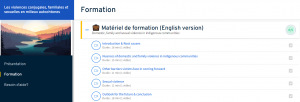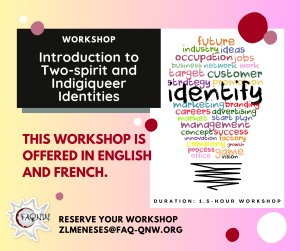BECOME A MEMBER
BE PART OF AN ALLIANCE THAT WORKS DAILY TO COUNTER DISCRIMINATION AND RAISE AWARENESS OF OUR CAUSE.
-
Benefits of being a QNW member!
Benefits of being a QNW member!
- Support the mission, vision and values of Quebec Native Women and defend the cause for which we have been working since 1974;
- Participate in QNW’s associative life by coming to support us during marches, demonstrations and vigils;
- To help eliminate the discrimination and racism still present in today’s society;
- To fight in solidarity the colonialism and sexism experienced by Indigenous women.
-
Members' rights
Members’ rights:
- Indigenous women members of QNW have the right to vote and to speak at the Councils of the Nations, as soon as they are registered.
- Indigenous women members of QNW have the opportunity to run for delegate to the annual membership meeting.
- Indigenous women members of QNW who are not delegates to the Annual Gathering of members have the right to speak only. Only delegates have the right to vote.
- Friendly members do not have the right to speak or vote at the Councils of Nations or at the Annual Gathering of members. However, they are entitled to attend as observers.
- All members are equal and no one can be discriminated against because of age, language, religion or sexual orientation.
- The categories imposed by the Indian Act, which QNW opposes, cannot be used to discriminate against members.
MEMBERS TYPES
Indigenous Members of QNW
Free
Any lndigenous person 18 years of age or older.
Friend Members
Free
Any person 18 years of age or older who is not of Indigenous descent.
Corporate Members
Free
Any organization that supports the mission, vision and values of Quebec Native Women.
WORKSHOPS & CONFERENCES
QNW offers a number of workshops and conferences that touch on the various issues on which the organization is working in order to train and/or raise awareness of participants to Indigenous realities. Click on the workshop or conference of your choice for more information.
-
Sexual Assault Awareness Workshop: My Sexuality, It's About Respect: Break The Silence! (In person)
This workshop includes a variety of information on sexual assault by addressing the following themes: myths and realities about sexual assault; definitions surrounding sexuality; statistics in the Indigenous environment; consequences of sexual assault on children, adults and adults who were victims as children; tips for listening to and guiding a victim; as well as the impact of colonization on sexuality. The number of activities offered during the workshop may vary according to the time available and the needs of participants.
Duration: Half-day or full-day workshop.
Registration: contact us by email at bphilippe@faq-qnw.org or use our online form in the Contact Us section.
Contact us -
Health Workshops (Teams Link)
The following workshops will be offered free of charge online to Indigenous communities indefinitely.
List of workshops available online:
1. “Indigenous Women and Colonization” – MANDATORY –
Target audience: This introductory, compulsory workshop is aimed at new QNW employees, nursing, medical and social work schools, and partners in the health file.
Topics: Colonization, the Indian Act, residential schools, CVR, the 60s Roundup, missing and deceased children, forced sterilization, birth alerts and youth protection. Each theme highlights the many social issues in communities and urban settings today.
Duration: 5 hours. It can be given in 2 parts
Offered in: FR
2. “Indigenous Women’s Health: Humanizing the Issues.”
Target audience: Workshop offered to community workers only, highly instructive for those working with indigenous clientele (women, children, men, seniors).
Topics: This workshop is designed to situate the issue in its socio-historical context, then break it down to present the elements that are the determinants of health and safety for indigenous women in communities and urban settings. Topics covered include health determinants (accessibility, housing, behaviours, chronic health problems, disability, education, employment and income, various forms of violence, etc.), statistics on SA, intergenerational trauma, incarceration, Jordan’s and Joyce’s principles, cultural safety, systemic racism, relations with various police forces and possible solutions.
Prerequisite: Workshop # 1 – Indigenous women and colonization.
Duration: 3H30 hours.
Offered in: FR
3. “Tools for Better Intervention.”
Target audience: Workshop offered to only community workers who provide follow-up services to indigenous clientele, NOT recommended for police officers.
Topics: This workshop is designed specifically for community workers. It covers the needs of a victim of violence, the work tools QNW has developed, networking, the medicine wheel, etc.
Prerequisite: Workshop # 1 – Indigenous women and colonization.
Duration: 3H30 hours.
Offered in: FR
Sample agenda for an online workshop:
8:30 to 8:40 am Beginning of the day with a prayer by an Elder
8:40 to 11:40 am Mandatory workshop
“Indigenous Women and Colonization,” 3 hours
11:40 am to 12 pm Question periodCommunity workers must complete the Indigenous Women and Colonization workshop to fully understand workshops 2 and 3.
The workshops can be scheduled during the day or evening and end no later than 9:00 pm.
For more information, please get in touch with Isabelle Paillé, Health Coordinator, by email at health@faq-qnw.org.
Contact us -
Domestic, Family, and Sexual Violence in Indigenous Environments (Pre-recorded training)
Domestic, Family, and Sexual Violence in Indigenous Environments
INTRODUCTION
This training is geared towards raising awareness and equipping the various socio-judicial stakeholders with the realities specific to the Indigenous context in terms of conjugal, family and sexual violence. Five specialists provide an in-depth presentation of the causes, issues and implications of these different types of violence in Indigenous environments. They also present solutions and advice for workers involved with Indigenous victims of domestic, family and sexual violence.
Specialized speakers and researchers:
• Pierre Picard, Groupe de recherche et d’interventions psychosociales en milieu autochtone
• Isabelle Paillé, Quebec Native Women
• Jeannie Nayoumealuk, Saturviit
• Cheyenne Vachon, Maison d’hébergement de Kawawachikamach
• Renée Brassard, École de travail social et de criminologie de l’Université LavalOBJECTIVES
Understanding the root causes of the prevalence of domestic, family and sexual violence in Indigenous contexts and the specific issues experienced by Indigenous victims of violence.
Recognizing the specificities of violence in an Indigenous environment.
Identifying ways to take into account the specific characteristics of violence in Indigenous environments when working with victims.PLAN
75-minute video clip divided into seven parts:
1 The root causes of the prevalence of domestic, family and sexual violence
2 The specific nature of violence in Indigenous communities
3 Additional difficulties when it comes to reporting
4 Sexual abuse
5 Preferred solutions
6 Intervention tips
7 ConclusionVIRTUAL ASYNCHRONOUS
VideoclipTraining for which eligibility has been confirmed by the Barreau du Québec for the purposes of mandatory continuing education, for a duration of 1 hour and 15 minutes.
This training is offered within the framework of the Sexual Violence and Domestic Violence Court.

-
2SLGBTQQIA+ Workshops
Workshop: Introduction to Two-spirit and Indigiqueer Identities.
This introductory workshop is aimed at diverse service providers to familiarize them, in a general way, with gender diversity in an indigenous context.
The topics covered include Two Spirit and Indigiqueer identities, their history and historical roles, the impact of colonization on the conception of gender, and tips for creating awareness and solidarity.
It is an opportunity for participants to raise awareness, exchange ideas and discuss the various aspects of gender diversity and the challenges currently facing communities.
The workshop is facilitated by Michelle Jayshree Ernest-Cohen, coordinator of the 2SLGBTQQIA+ file, and Zyanya Lopez Meneses, coordinator of the 2SLGBTQQIA+ information and research file.
This workshop is offered in English and French.
Duration: 1.5-hour workshop.

MAKE A DONATION
SHOW YOUR SUPPORT FOR QUEBEC NATIVE WOMEN
BY MAKING A DONATION TODAY.
